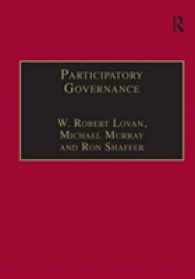- ホーム
- > 洋書
- > 英文書
- > Business / Economics
Full Description
Climate change, financial crises, and other issues of global scale no longer concern only the developed world. The binding power of globalization has placed these challenges at the doorstep of almost every country, testing the evolutionary capacity of monolithic governance systems bound by institutional legacy and administrative stagnation. This book locates the concept of adaptive governance, used primarily in environmental management, within the context of economic policy. Introducing flexible economic opportunism, it argues that a particular style of institutional and administrative versatility enables innovative, evidence-based policy development.
This book mines institutional economics, public administration, and research theory and practice for complementary elements that can inform an emerging governance paradigm based on flexible economic opportunism. Through an eclectic suite of cases from the developing and developed worlds including Asia and North America, this book reveals how patterns of institutional and administrative change impact the efficacy of public policy. Flexibility may be this century's most critical dimension of global competitiveness, and systems configured to quickly and comprehensively capture economic opportunities will win the marketplace of development ideas. This book advances that discussion.
Contents
Introduction Part I: Institutions 1. Understanding Institutions 2. Institutions in Research and Practice 3. Institutions and Economic Development 4. Institutions and Political Power 5. Institutions and Global Urbanization Part II: Public Administration 6. Contrasting Paradigms: Traditional Bureaucracy and Collaborative Governance 7. Emergent Paradigms: From Neoclassical to Postmodern 8. Administration in Local and National Development Part III: Evidence-Based Policy 9. Foundational Thinkers in Epistemology 10. Research Methods and Empirical Validity 11. Use of Evidence in Environmental Regulation 12. Nationalizing Benefits and Localizing Costs in Industrial Development 13. Evidence-Based Intervention for Housing Markets Conclusion








